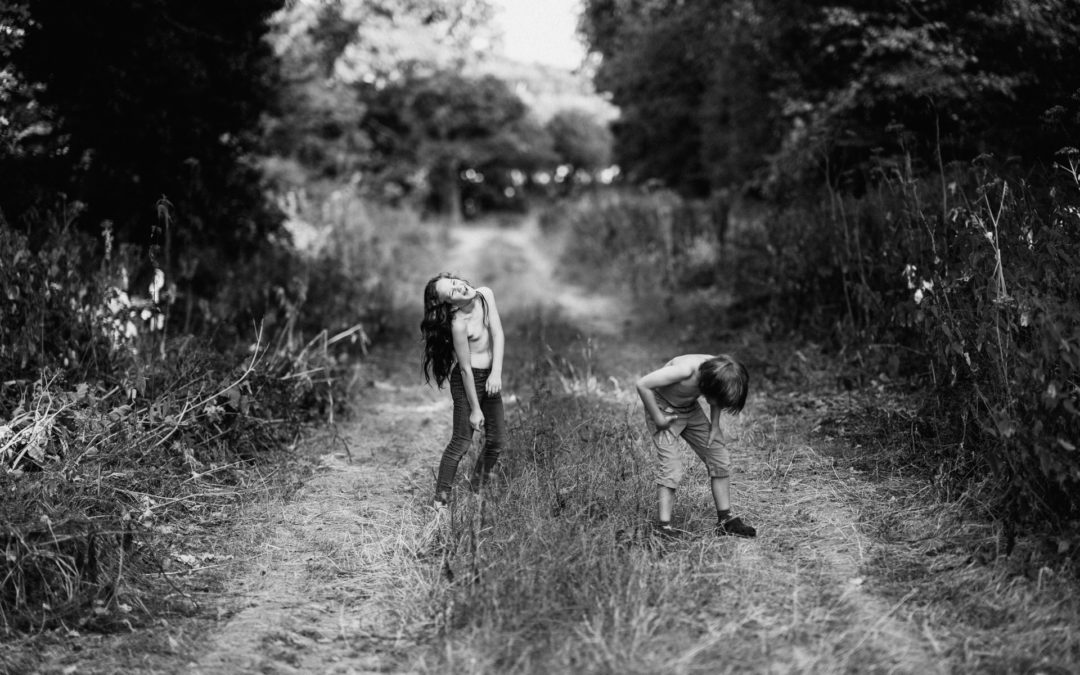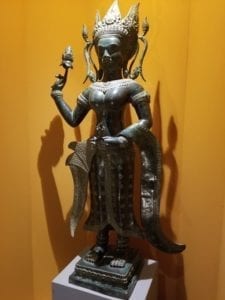Photograph by Annie Spratt
Reminiscences of childhood have recently erupted, brought upon by cradling the newborns of dear young friends, fixating on the media’s coverage of mass killings of small children, and savoring the magical moments I have playing with my grandson. I offer my readers this memory of a child in the 1950s. Perchance it will be a springboard for your own memories. Perhaps we will pay closer attention to the children in our spheres. – Jinx Davis
I’ve always known life was a stage. I learned this from my Papa. Papa was a dapper man- a mix between Gene Kelly and Danny Kaye. Danced his way through college and danced through the prison, where they sent him when he was 18 and teaching sixth grade and wouldn’t sign up for the draft in WWII.
But Grandpa wouldn’t have a son disgrace his nation, he being a dentist and part-time preacher, roaming the Midwest countryside with his family troupe of players and their bigger-than-life puppets that recreated bible stories and medieval morality plays. My Papa always played Baby Jesus because he was so smart and cute, so it wasn’t right that Baby Jesus was in prison because he wouldn’t kill for his country. Grandmother was Quaker, so she felt a kindred spirit to her son’s choice for nonviolence and his constant quoting of Mahatma Gandhi. But Grandmother was a stern woman in a long black dress and tight bun shrinking her neck. She’d seen too much of the hardness of life. Too much feeding children and burying babies to get lost in the rhetoric of philosophers or social activists.
Papa hung out in prison for some time, lulling over the possibilities of his life and learning to hate the sound of a flushing toilet. The toilet was all you’d hear most nights in the lonely cold prison. Toilets swallowing the silent sobs, consuming young men’s dreams and torn pages of love letters. It was into a toilet that Papa had shredded the last remaining evidence of his link to the organized group of conscientious objectors opposing the US government’s unwillingness to help the Jews being slaughtered long before the war began.
To escape the sound of flushing toilets and his father’s scornful preaching, Papa agreed to join the Air Force and become a spy. The government felt this was a fair exchange. He flew B-17 bombers, and on his final mission, he was shot down and fell into an apple tree in a sleepy German village.
Papa set up shop at the prisoner of war camp Stalag 17 and worked in the theater. They built their stage from Red Cross boxes, and it served to hide prisoners during escape attempts- even the occasional German soldier who’d seen enough and wanted to escape. After rehearsing My Hearts in the Highlands, Othello, Show Boat, or Oedipus the King, Papa would fall asleep listening to the eerie and tormented ballads the Russians sang as they held each other and died from cold and starvation.
I was fed on a diet of prison camp stories. Little Daniel from Montana went mute and crazy after someone stole his pet rabbit from between his sleeping arms and cooked it. There was Johnnie, who ate light bulbs to remember how to chew and died from a bleeding stomach. The Christmas Eves when the prisoners danced and exchanged gender roles and long embraces; the fear of the dogs who would tear at their boots as they swung from the rafters and clung for their lives; and the Death March. That Death March across Germany, when a 70-pound Papa fell to his knees and swore to the Gods as he tore every page of a beloved book to tiny shreds because it became too heavy to carry. He buried them, along with his ability to forgive, in the rich black German soil so that no one could ever read them again. And the turnips the guards allowed them the prisoners to eat, knowing that their bellies would bloat and they’d scream their way to death within minutes …and the secretly encoded letters Papa sent to his family filled with news of the war- letters that spoke of relatives that did not exist and events that never occurred- letters intercepted by the US intelligence but then passed on to his family, who grew to believe Papa had lost his mind. This was the hero’s journey I grew up on.
These were the stories I took to my own stage, my first and finest stage- Indian Hollow.
As children, we built Indian Hollow in a wooded grove of maples, poplars, and ancient black walnut trees during carefree summer days. It was a long holler from the neighbors’ front porches and a stone’s throw away from the village landfill that served as our pirate’s treasure chest. We’d haul off nearly everything the village workers would truck in: overstuffed chairs, wood trunks filled with rolls of fabric and old photos, tarnished brass bird cafes, arched doors, tires, crates, baby high-chairs, and cradles, old dresses and high topped boots. We used every saw, hammer, screwdriver, and ax we could rustle from every tool shed.
By the end of our second summer of labor, a playhouse fit for Shakespeare had been built by our young blistered hands. It was complete with a dug-out cellar with ancient hieroglyphics painted on its clay walls and crevices sculpted to hold candles during our re-enactments of Cleopatra. We boasted a full kitchen with tarnished silverware, a bedroom, a living room, and a Captain’s Walk that climbed to the stars and swayed with the deep sighing of the autumn winds. The hobos that jumped off the nearby railroad tracks found Indian Hollow and slept on its cot beds at night. They left thank you notes tacked to the hewn front door and my parents, aware of their presence, simply made sure we brought a pot of soup for them to eat and took Cindy, our huge Great Dane, as our guardian.
This was the sacred stage of the dramas we played: Anne Frank; the Civil War; Pioneers and Indians; slavery and the Underground Railroad; Pocahontas; Little House on the Prairie; and Father Damien on the rocky cliffs of Molokai in his beloved leper colony.
We repeatedly played the story of Helen Keller and her Teacher, Anne Sullivan. I always got to play Helen because my friends wouldn’t eat dirt. So I would crawl around our playhouse on all fours, touching everything in sight and bringing it to my nose and mouth- lost in the dark vacuum of Helen’s young mind before the miracle day. The day when the Teacher’s hand finally spelled light into her mind with the word ‘water’ as the pump poured out life and meaning. Ears stuffed with cotton and blindfolded by a red bandana, I would wobble and run through Indian Hollow, seeking the rays of sun that slipped through the trees, listening to cold stones through my cheeks, and caressing the tree’s bark to feel its sorrow.
It was in Indian Hollow that I learned to be possessed by the world’s spirits. Time had no meaning and every meaning. It transported my 8-year-old body across continents and centuries, filling my lungs with the smell of slave ships, baked cranberry pies, and the open roar of campfires. Our parents would call out across the field at dusk to return home for dinners and hot baths. I would always linger, letting my friends go off without me.
Alone, I would climb the wobbly ladder that led to our Look Out in the trees, open my arms to the darkening skies and call out to the mythic force field that danced in the shadows overhead. Then, like the opening paragraph of Homer’s Odyssey, I sang out unabashedly:
Sing to me, Muse, of the child of the whirlwind I am. Driven by the
aching desire to stir the boundaries between us all, who has accomplished
the feats of becoming Persephone, Goddess of the Underworld; Anne Frank,
Forgiver of Evil; Medea, Avenged Murderer of Her Children; Harriet Tubman,
Keeper of the Freedom; and Florence Nightingale, Healer of the Heart.
Now I am stuck in the shadowy pit of Mrs. O’Brien’s second-grade class. I yearn to bring forth the Mighty Winds of Heaven so that I may give tongue to the voice of the Forgotten and breathe fire into the callous minds of Becky Washington, Timmy Randall, Debra Summer, and everybody else in my classroom (except my friend Laurie) who only play with Baby Dolls, rockets and trucks.
I needed to tell the tales of the Netherworld and cross the River of Styx, between
Life and Death, Long Ago and Far Away, between Yesterday, Today and Forever.
Sing to me, Muse. Sing to me!
Then I would crawl down from our awkward scaffolding and meander slowly home, unspoiled by the plague of embarrassment and untarnished by the blight of fear. I would return to the smell of gingerbread in the oven and chicken stew on the stove. Crossing the threshold of my house, I would re-enter a straggly child with tangled hair and muddy shoes. A small child was told to wash her hands and come to dinner- a mere child, bearing only the echoes of the Greek Goddess she thought she was.


